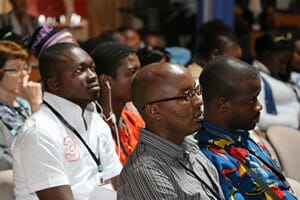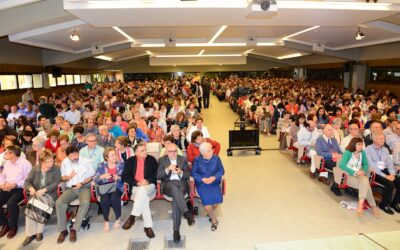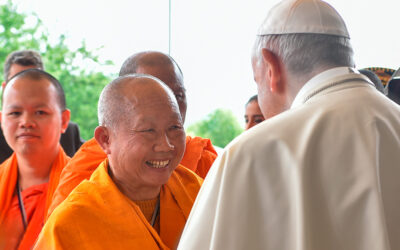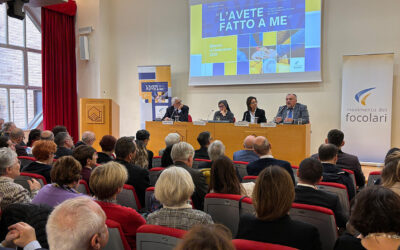 «We are a new generation that wants to take the helm of the Economy of Communion. We are well aware of our inexperience and immaturity but we are also glad to feel that this is precisely our strong point, and we do not want to stop dreaming.» Liliane Mugombozi, a journalist in Kenya, picked up the voice of a young Cameroonese among the participants of the international Economy of Communion (EoC) school, underway from 22 to 26 May at Mariapolis Piero, the Focolare town close to Nairobi, Kenya. «Upon entering that conference hall – she wrote – you could feel the energy of such a young population: vigorous, and full of expectations, hopes, aspirations and dreams that seem almost unthinkable amid all the challenges their continent is faced with.» They were students in economics, development, social sciences, entrepreneurs and followers, coming from all the Sub-Saharian regions, Lebanon, Egypt, Italy, Hungary, Argentina, Brazil, Chile, Mexico and Australia. Amidst all the greetings from various parts of the world, applause broke out when they heard the message of the Dean of Cagliari University, and when Prof. Maria Del Zompo recalled the painful event of the massacre of the young students of Garissa, to remind the youth present of the importance of educational structures, and encourage them in their desire to live and diffuse the ideals of the EoC. Vittorio Pelligra, one of the teachers, presented the method, the roadmap set for these days: applied reciprocity. «It is a special school of dialogue and communication, where we can share our intuitions, doubts, projects and dreams. We are all protagonists, and are ready to give all and receive all from everyone!»
«We are a new generation that wants to take the helm of the Economy of Communion. We are well aware of our inexperience and immaturity but we are also glad to feel that this is precisely our strong point, and we do not want to stop dreaming.» Liliane Mugombozi, a journalist in Kenya, picked up the voice of a young Cameroonese among the participants of the international Economy of Communion (EoC) school, underway from 22 to 26 May at Mariapolis Piero, the Focolare town close to Nairobi, Kenya. «Upon entering that conference hall – she wrote – you could feel the energy of such a young population: vigorous, and full of expectations, hopes, aspirations and dreams that seem almost unthinkable amid all the challenges their continent is faced with.» They were students in economics, development, social sciences, entrepreneurs and followers, coming from all the Sub-Saharian regions, Lebanon, Egypt, Italy, Hungary, Argentina, Brazil, Chile, Mexico and Australia. Amidst all the greetings from various parts of the world, applause broke out when they heard the message of the Dean of Cagliari University, and when Prof. Maria Del Zompo recalled the painful event of the massacre of the young students of Garissa, to remind the youth present of the importance of educational structures, and encourage them in their desire to live and diffuse the ideals of the EoC. Vittorio Pelligra, one of the teachers, presented the method, the roadmap set for these days: applied reciprocity. «It is a special school of dialogue and communication, where we can share our intuitions, doubts, projects and dreams. We are all protagonists, and are ready to give all and receive all from everyone!»  After tracing a brief history of the EoC, its birth and growth from 1991 up to today, a question arose: Is the EoC a path for Africa? The dialogue between teachers and participants transformed the auditorium into contagious enthusiasm. «How can we influence our youth?» each one asked. «We, as the youth, are tired of being exploited by politicians as the target in their manifestos. Not only we expect new methods of relating with one another, so does the world… the EoC is one of the solutions, and we feel it.» The aspect of the challenges and resources of the continent’s youth obviously could not be overlooked: the identity crisis in globalised society, poverty, conflicts, enlarged families, the brain drain of the continent, unemployment, and education which is increasingly internationalised without considering the actual educational needs of society around us. These are just the first steps of the school, Liliane Mugomobozi remarked, «but the youth present, upon discovering the new economic categories, already foresee a better future and cannot wait to return to their countries to spread it to as many people possible.» The teachers also recounted their own life stories that had led them to make daring choices in life. A deep dialogue ensued: teachers and students sharing their dreams, frustrations, discouragement, but also small and big success stories. Topics ranged from the great themes like “climate change” to international relations. The youth coming from the mining region of Katanga (DRC), proved to be well aware of the drama that had struck them.
After tracing a brief history of the EoC, its birth and growth from 1991 up to today, a question arose: Is the EoC a path for Africa? The dialogue between teachers and participants transformed the auditorium into contagious enthusiasm. «How can we influence our youth?» each one asked. «We, as the youth, are tired of being exploited by politicians as the target in their manifestos. Not only we expect new methods of relating with one another, so does the world… the EoC is one of the solutions, and we feel it.» The aspect of the challenges and resources of the continent’s youth obviously could not be overlooked: the identity crisis in globalised society, poverty, conflicts, enlarged families, the brain drain of the continent, unemployment, and education which is increasingly internationalised without considering the actual educational needs of society around us. These are just the first steps of the school, Liliane Mugomobozi remarked, «but the youth present, upon discovering the new economic categories, already foresee a better future and cannot wait to return to their countries to spread it to as many people possible.» The teachers also recounted their own life stories that had led them to make daring choices in life. A deep dialogue ensued: teachers and students sharing their dreams, frustrations, discouragement, but also small and big success stories. Topics ranged from the great themes like “climate change” to international relations. The youth coming from the mining region of Katanga (DRC), proved to be well aware of the drama that had struck them.  And a big dream is taking shape: the young and very young people, enthusiasts of life, strongly believe in the ideal of a United World shared with many other youths from the whole world. It is nothing less than “the dream of God,” as Chiara Lubich once said precisely to the youth. It is a dream that they will not give up even when confronted by important choices in life, as has been such with the university faculty, in order to have an impact on society and to actualize in practice, and not in words, a just and dignified society for every human being. The school, to end on 26 May, will be followed by the EoC international Congress: businesses, entrepreneurs and workers will come face to face, and the ideal will turn into business practices, challenges going on in the employment world, and creative choices. Among the themes to be discussed are: creativity and communion, the culture of communion, business and employment, poverty and wealth and saying yes to an Economy of Communion. These themes will turn into workshops in politics, microfinance and poverty, and startups, involving young scholars and researchers, management, networks of entrepreneurs and the EoC in dialogue with the African cultures. Facebook Pages on the event Live streaming event: http://live.focolare.org/eoc/ on 27 May, 3.00 – 6.30 pm (Kenyan time, 2.00 – 5.30pm CET), and then morning sessions of the scheduled program 9.00am -12.30pm Kenyan time. Programma eventi
And a big dream is taking shape: the young and very young people, enthusiasts of life, strongly believe in the ideal of a United World shared with many other youths from the whole world. It is nothing less than “the dream of God,” as Chiara Lubich once said precisely to the youth. It is a dream that they will not give up even when confronted by important choices in life, as has been such with the university faculty, in order to have an impact on society and to actualize in practice, and not in words, a just and dignified society for every human being. The school, to end on 26 May, will be followed by the EoC international Congress: businesses, entrepreneurs and workers will come face to face, and the ideal will turn into business practices, challenges going on in the employment world, and creative choices. Among the themes to be discussed are: creativity and communion, the culture of communion, business and employment, poverty and wealth and saying yes to an Economy of Communion. These themes will turn into workshops in politics, microfinance and poverty, and startups, involving young scholars and researchers, management, networks of entrepreneurs and the EoC in dialogue with the African cultures. Facebook Pages on the event Live streaming event: http://live.focolare.org/eoc/ on 27 May, 3.00 – 6.30 pm (Kenyan time, 2.00 – 5.30pm CET), and then morning sessions of the scheduled program 9.00am -12.30pm Kenyan time. Programma eventi
Don’t make distinctions between people
Don’t make distinctions between people




0 Comments